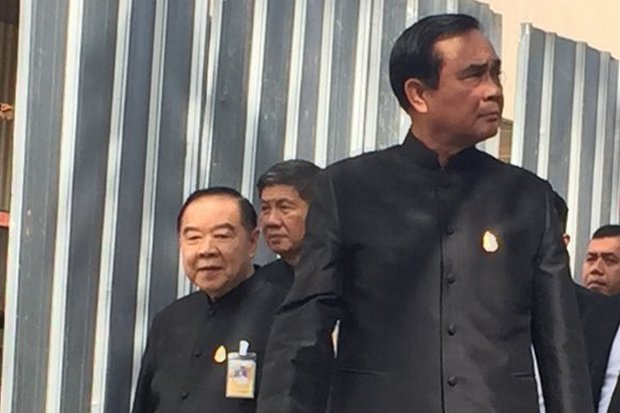
Prime Minister Prayut Chan-o-cha has appealed for public support for the Thai-Chinese high-speed railway project to help it get off the ground, while reiterating that his Section 44 order to speed up construction is in the country's best interests, not a special favour to China.
The prime minister's comments came amid mounting criticism against his Section 44 order, which was issued to clear legal hurdles for Chinese operators to press ahead with the construction of the 179-billion-baht Bangkok-Nakhon Ratchasima train project after lengthy delays.
The prime minister insisted that Thai companies will be allowed to participate in the project and that the process to recruit local operators will be done in accordance with the law, including taking bids for contracts.
- Commentary: 'Cooperation' in name only
The prime minister stressed that the railway project is necessary in order to develop a network of interconnecting transport routes across the country.

"We have to consider lasting benefits that the project will bring, especially economic benefits that will occur in areas along the rail route, not just considering income from passengers," Gen Prayut said.
He gave assurances that the public will not be short changed on the benefits they were promised from the project. "Just let the Thai-Sino rail project materialise," the prime minister said.
According to Gen Prayut, details of the rail project have already been explained and discussions held to clarify matters relating to engineers and technology transfer, with the Council of Engineers and the Architect Council of Thailand giving their consent.
Gen Prayut said domestic funding for the project is still sufficient and that China has not forced Thailand to take out a loan, the prime minister said.
Transport Minister Arkhom Termpittayapaisith said on Tuesday the project will be divided into two parts and invested in accordingly -- civil and infrastructure work, which account for 75%, and rails and trains, which includes signalling and operation systems, accounting for 25%.
The civil works will be operated by local contractors while the second part will be done by China.
The ministry will propose the contract to the cabinet for approval this month. The construction is expected to commence in August or September.
He insisted that the rail project will not result in Thailand losing its sovereignty or territory to China as claimed.
The project belongs to the Thai government, which has the country's best interests at heart he said, while insisting that no land would be divided for China to manage.
It was reported previously that China requested the holding rights for land along the tracks for commercial purposes.
Thailand will make its own investment to protect its rights on the use of land covering station areas and areas along the rail route, which is under the supervision of the State Railway of Thailand, Mr Arkhom said.
China has also accepted a condition to transfer technology and provide details of the construction's design to Thai personnel, he assured.
Sumet Ongkittikul, a researcher at the Thailand Development Research Institute (TDRI), said the government should not approve the Thai-Sino rail project without thoroughly considering the impact. There is a risk of the route overlapping with the Thai-Japanese high-speed railway in the north of Thailand, he said.
He said in his commentary in Post Today Tuesday that, "The issue that has not been concluded is the overlapping route of the two prospective projects from Bangkok to Ayutthaya province because the two routes would share the same starting point in Bangkok."
The Thai-Sino railway will run from Bangkok to the northeastern province of Nakhon Ratchasima, while the Thai-Japanese project will go north from Bangkok to Chiang Mai. There has not been any decision on how or whether to share the infrastructure or rail track between the two high-speed train routes, he said.
Mr Sumet said based on the signal that the government gave via the approval of Section 44, Thailand will have at least two high-speed rail systems.
"From an economic standpoint, having two different railway systems will require higher operating costs and make it more difficult to develop two networks rather than running a single system."
He said that the government should think through the following issues before approving the construction of the Thai-Sino railway, including whether the high-speed train is necessary for Thailand.
Gen Prayut invoked Section 44 to expedite the Thai-Chinese high-speed railway line between Bangkok and Nakhon Ratchasima and enable work to begin this year.
The order instructs the State Railway of Thailand to hire a Chinese state enterprise contractor to facilitate and supervise the railway line construction. The company must be certified by China's National Development and Reform Commission.